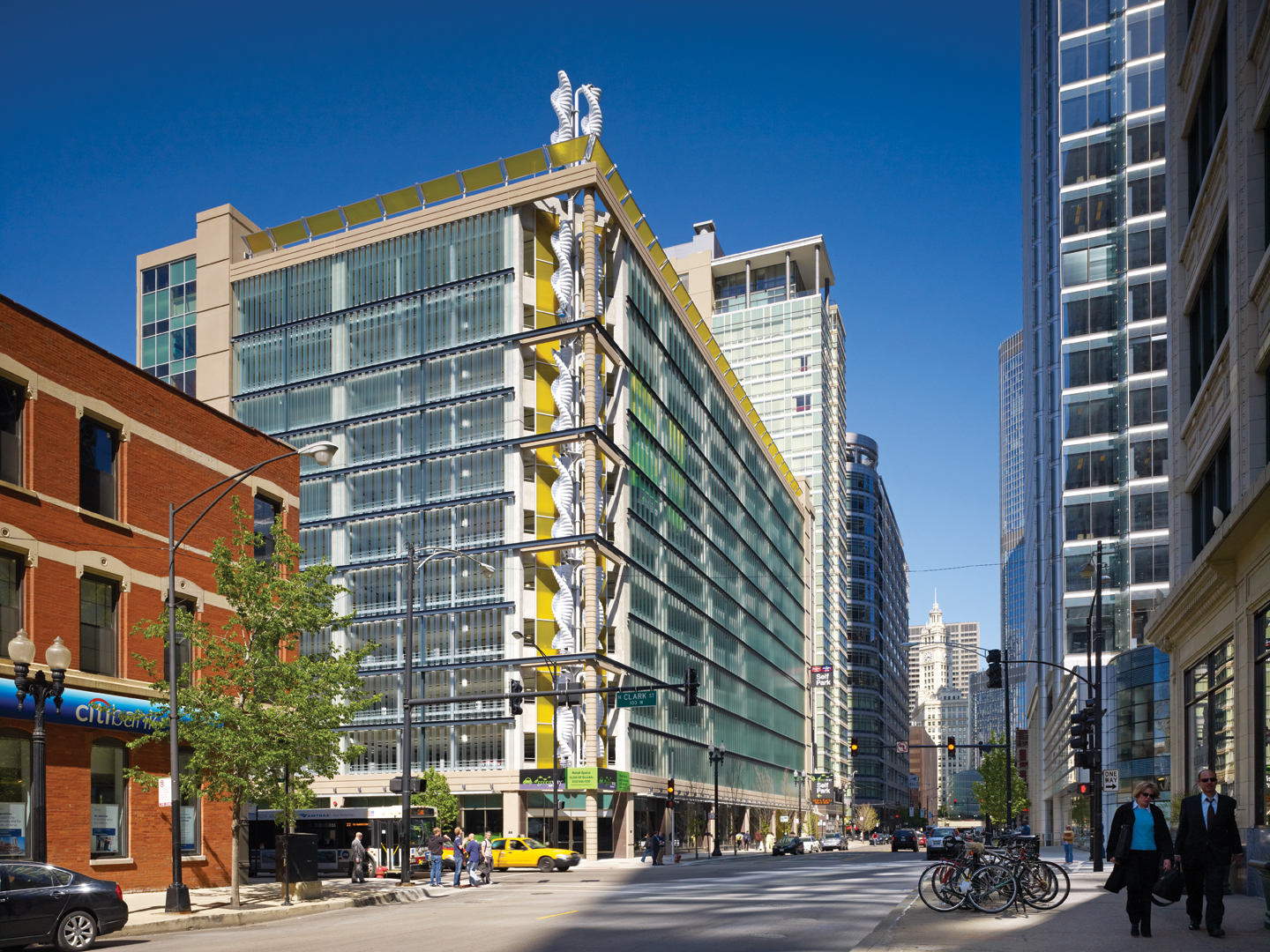The Greenway Self-Park in Chicago’s River North neighborhood shines like a beacon of enlightened green design on a block crowded with office and residential towers. The 285,000-sf parking structure’s green-tinted glass exterior doubles as a ventilation and daylighting system. Its signage gives parkers tips on how to live greener. River North developer Friedman Properties is planning a residential tower next door so that the parking garage’s green roof can serve as a garden for future condo owners.
What sets the 800-car parking structure apart, however, is its 12-paired array of wind turbines. The vertical axis turbines, manufactured by Helix Wind, Poway, Calif., are positioned on the southwest corner of the building near the relatively wide corridor of Clark Street, a busy thoroughfare. Todd Halamka, director of design at the Chicago office of HOK and lead designer on the project, calls the turbines “a kinetic and functional sculpture piece.”
Weather data from collection stations at O’Hare and Midway airports and weather buoys off of Chicago’s lakefront, coupled with wind tunnel tests taken from nearby buildings, were used to evaluate the amount of wind that could be harvested from the site. Estimates by the Building Team put the average wind at that corner at 10 mph at grade level over a year, which, according to the manufacturer, should be sufficient to generate electricity for the structure. The turbines, which extend from the second story to the very top of the structure on the southwest corner of the building, should generate enough power to light the building’s exterior and still send some energy back to the grid through the structure’s reversible electricity meter, Halamka said.
The first day I visited the site there was a strong breeze blowing in from the southwest and the long helical blades of the turbines, shaped from corrugated metal, appeared to be rotating quite actively. On another less windy day, however, they did not appear to be moving at all. Because the parking facility has only been open since September, not enough reliable data has been collected on how much power the turbines have generated.
The Building Team of designers HOK/Cubellis and general contractor Bovis Lend Lease took extra steps to green the parking structure. Greenway Self-Park’s signage gives garage users tips on living more sustainably. Each floor has a different nature theme, such as water, air, and earth conservation. The garage has electric-car charging stations and priority parking for hybrid gas/electric vehicles and for Zipcar and I-Go car-sharing vehicles. Its planned green roof has rainwater cisterns for water collection. Almost all of the building materials were locally sourced. Light sensors control the building’s interior lights and shut them off if enough daylight is coming through the translucent glass-walled exterior.
HOK says the building is registered with LEED and is currently in the commissioning process. “Rather than design a traditional closed garage which has an MEP system and has to run 24/7, working with the city of Chicago we were successful in creating a naturally ventilated garage,” Halamka said. Each floor maintains at least 20% open exterior wall area that provides natural ventilation. “We varied the openings (on the channel glassed walls) so that the glass panels have different spacing that creates a subtle visual tapestry, so that each façade takes advantage of the natural light and air,” he said.
As Chicago’s River North neighborhood continues to develop, Halamka says he believes a more sustainable urban strategy would be to build out the surrounding surface parking lots with ground-floor retail capped with office and residential space and then condense the parking into a more vertical arrangement that promotes local live-work opportunities. “Cars are an inevitable means of transportation,” said Halamka. “It is how we choose to live and use our vehicles in a more sustainable lifestyle that is important.”
For now, building-mounted wind harvesting like that at Greenway Self-Park is still in its infancy. HOK says both its Chicago office and building owner Friedman Properties are committed to monitoring exactly how much energy the wind turbines at the Greenway Self-Park are generating two years from now, when there will be enough data to gauge actual production. BD+C
Related Stories
| May 16, 2011
USGBC and AIA unveil report for greening K-12 schools
The U.S. Green Building Council and the American Institute of Architects unveiled "Local Leaders in Sustainability: A Special Report from Sundance," which outlines a five-point national action plan that mayors and local leaders can use as a framework to develop and implement green schools initiatives.
| May 16, 2011
Dassault Systèmes to distribute Gehry Technologies’ digital project
Dassault Systèmes and Gehry Technologies announced that Gehry Technologies’ Digital Project products will be integrated into the Dassault Systèmes’ portfolio and distributed through Dassault Systèmes. Digital Project is a suite of 3D BIM applications created by Gehry Technologies using Dassault Systèmes’ CATIA as a core modeling engine.
| May 11, 2011
DOE releases guide for 50% more energy-efficient office buildings
The U.S. Department of Energy today announced the release of the first in a new series of Advanced Energy Design Guides to aid in the design of highly energy efficient office buildings. The 50% AEDG series will provide a practical approach to commercial buildings designed to achieve 50% energy savings compared to the commercial building energy code used in many areas of the country.
| May 10, 2011
Google hires Ingenhoven Architects to design new Mountain View office
The current Googleplex is straining at the seams and yet the company is preparing its biggest hiring surge ever, so Google decided now’s the time to build its own office space—a first for the Internet giant. The company hired Ingenhoven Architects, a German firm that specializes in sustainable architecture, to create plans for what could be a 600,000-sf office.
| May 10, 2011
Solar installations on multifamily rooftops aid social change
The Los Angeles Business Council's study on the feasibility of installing solar panels on the city’s multifamily buildings shows there's tremendous rooftop capacity, and that a significant portion of that rooftop capacity comes from buildings in economically depressed neighborhoods. Solar installations could therefore be used to create jobs, lower utility costs, and improve conditions for residents in these neighborhood.
| May 10, 2011
Dinner is now served…atop the Lincoln Memorial?
Take a look at the temporary restaurant sitting atop Brussels’ historic Arc de Triomphe-Triomfboog. The Cube, by Electrolux, offers 18 diners a spectacular view of the Parc du Cinquantenair, and is one of two structures traveling across Europe, making stops at famous landmarks in Belgium, Italy, Switzerland, Sweden, and Russia. What do you think about one of these 60-tonne structures being placed on a U.S. memorial?
| May 6, 2011
Ellerbe Becket now operating as AECOM
*/ The architecture, interiors and engineering firm Ellerbe Becket, which joined AECOM in 2009, has fully transitioned to operating as AECOM as of May 2, 2011.
| May 2, 2011
URS acquires Apptis Holdings, a federal IT service provider
SAN FRANCISCO, CA and CHANTILLY, VA– April 28, 2011 – URS Corporation and Apptis Holdings, Inc., a leading provider of information technology and communications services to the federal government, announced that they have signed a definitive agreement under which URS will acquire Apptis.
| May 2, 2011
Perkins+Will merges with Vermeulen Hind Architects, offically launches Perkins+Will Canada
Ottawa and Hamilton-based Vermeulen Hind Architects, one of Canada’s leading healthcare architectural firms, has merged with Perkins+Will. Vermeulen Hind joins Toronto-based Shore Tilbe Perkins+Will and Vancouver-based Busby Perkins+Will to create Perkins+Will Canada. The combination marks the official launch of Perkins+Will Canada, a merge that will establish the firm as among the pre-eminent interdisciplinary design practices in Canada.









